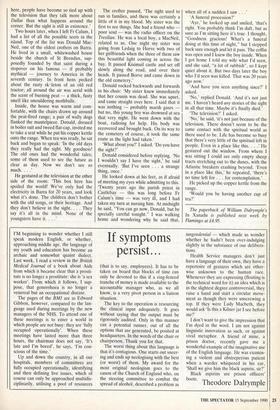If symptoms
persist...
I'M beginning to wonder whether I still speak modern English, or whether, approaching middle age, the language of my youth and education has become an archaic and somewhat quaint dialect. Last week, I read a review in the British Medical Journal of a book about Aids from which it became clear that a prosti- tute is no longer a prostitute: she is 'a sex worker'. From which it follows, I sup- pose, that gonorrhoea is no longer a venereal but an occupational disease.
The pages of the BMJ are as Edward Gibbon, however, compared to the lan- guage used during meetings by the new managers of the NHS. To attend one of these meetings is to enter a world in which people are not busy: they are 'fully occupied operationally'. When these meetings have lasted more than three hours, the chairman does not say, 'It's late and I'm bored', he says, 'I'm con- scious of the time.'
Up and down the country, in all our hospitals, members of committees are fully occupied operationally, identifying and then defining live issues, which of course can only be approached multidis- ciplinarily, , utilising a pool of resources (that is to say, employees). It has to be taken on board that blocks of time can only be devoted to this if a ring-fenced tranche of money is made available to the accountable manager who, as we all know, is a very pivot person in a liaison situation.
The key to the operation is resourcing the clinical input adequately. It goes without saying that the output must be rigorously audited. Only in this manner can a potential runner, out of all the options that are generated, be posited at headquarters. In the words of the chair or chairperson, Thank you for that.
The worst thing about this language is that it's contagious. One starts out sneer- ing and ends up neologising with the best (or worst) of them. My award for the most original neologism goes to the canon of the Church of England who, on the steering committee to combat the spread of alcohol, described a problem as tan gendential — which made us wonder whether he hadn't been over-indulging slightly in the substance of our delibera- tions.
Health Service managers don't just have a language of their own, they have a repertoire of gestures which are other- wise unknown to the human race. Whenever they are expressing (floating is the technical word for it) an idea which is in the slightest degree controversial, they raise a hand and start a circular move- ment as though they were unscrewing a top. If they were Lady Macbeth, they would ask 'Is this a Kilner jar I see before me?'
I don't want to give the impression that I'm dyed in the wool. I am not against linguistic innovation as such, or against vivid metaphor. A friend of mine, a prison doctor, recently gave me a wonderful example of the imaginative use of the English language. He was examin- ing a violent and obstreperous patient when a warder whispered in his ear, 'Shall we give him the black aspirin, sir?'
Black aspirins are prison officers' boots.
Theodore Dalrymple


























































 Previous page
Previous page